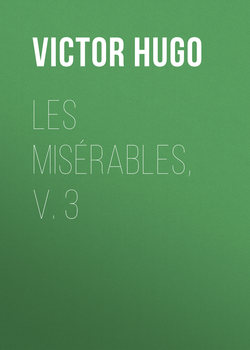Читать книгу Les Misérables, v. 3 - Victor Hugo, Clara Inés Bravo Villarreal - Страница 21
BOOK II
LE GRAND BOURGEOIS
CHAPTER VIII
TWO DO NOT MAKE A PAIR
ОглавлениеAs for M. Gillenormand's two daughters, they were born at an interval of ten years. In their youth they had been very little alike, and both in character and face were as little sisters as was possible. The younger was a charming creature, who turned to the light, loved flowers, poetry, and music, was enthusiastic, ethereal, and mentally betrothed from her youth up to some heroic figure. The elder had her chimera too; she saw in the azure an army-contractor, some fat and very rich man, a splendidly stupid husband, a million converted into a man, or else a prefect; the reception at the prefecture, an usher in the ante-room with a chain round his neck, the official balls, the addresses at the mansion-house to be "Madame la Prefête," – all this buzzed in her imagination. The two sisters wandered each in her own reverie, at the period when they were girls, and both had wings, – the one those of an angel, the other those of a goose.
No ambition is fully realized, at least not in this nether world, and no paradise becomes earthly in our age. The younger married the man of her dreams, but she was dead, while the elder did not marry. At the period when she enters into our narrative, she was an old virtue, an incombustible prude, with one of the most acute noses and most obtuse intellects imaginable. It is a characteristic fact that, beyond her family, no one had ever known her family name; she was called Mlle. Gillenormand the elder. In the matter of cant, Mlle. Gillenormand could have given points to a Miss. It was modesty pushed to the verge of the impure. She had one frightful reminiscence in her life, – one day a man saw her garter.
Age had only heightened this pitiless modesty, – her chemisette was never sufficiently opaque, and never was high enough. She multiplied brooches and pins at places where no one dreamed of looking. The peculiarity of prudery is to station the more sentries the less the fortress is menaced. Still, let who will explain these old mysteries of innocence, she allowed herself to be kissed without displeasure by an officer in the Lancers, who was her grand-nephew, and Théodule by name. In spite of this favored Lancer, however, the ticket of "Prude," which we have set upon her, suited her exactly. Mlle. Gillenormand's was a species of twilight soul, and prudery is a semi-virtue and a semi-vice. She added to prudery the congenial lining of bigotry; she belonged to the Sisterhood of the Virgin, wore a white veil on certain saints' days, muttered special orisons, revered "the holy blood," venerated "the sacred heart," remained for hours in contemplation before a rococo-Jesuit altar in a closed chapel, and allowed her soul to soar among the little marble clouds and through the large beams of gilt wood.
She had a chapel friend, an old maid like herself, of the name of Mlle. Vaubois, absolutely imbecile, and by whose side Mlle. Gillenormand had the pleasure of being an eagle. Beyond Agnus Deis and Ave Marias, Mlle. Vaubois knew nothing except the different ways of making preserves. Perfect of her kind, she was the ermine of stupidity, without a single spot of intelligence. We must add that Mlle. Gillenormand rather gained than lost by growing old. She had never been wicked, which is a relative goodness; and then years abrade angles, and time had softened her. She had an obscure melancholy, of which she did not herself possess the secret, and about her entire person there was the stupor of a finished life which has not begun. She kept house for her father; such families, consisting of an old man and an old maid, are not rare, and have the ever-touching appearance of two weaknesses supporting each other.
There was also in this house a child, – a little boy, – who was always trembling and dumb in the old gentleman's presence. M. Gillenormand never spoke to this boy except with a stern voice, and at times with upraised cane. "Come here, sir, – scamp, scoundrel, come here, – answer me, fellow, – let me see you, vagabond!" etc., etc. He adored him; it was his grandson, and we shall meet him again.
